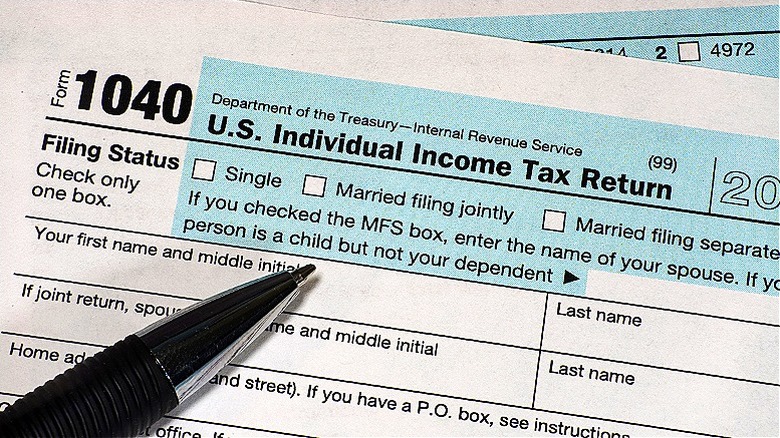What Happens If Husband And Wife File Taxes Separately? Your Guide To This Choice
Detail Author:
- Name : Frances Reichert I
- Username : mhand
- Email : elizabeth33@auer.info
- Birthdate : 1995-04-29
- Address : 405 Weimann Turnpike Suite 163 Lake Rex, ND 63568
- Phone : +1.719.283.1518
- Company : Schroeder PLC
- Job : Biologist
- Bio : Pariatur quia maxime aut ut veritatis nihil incidunt. Quaerat tenetur facere id est et voluptates et.
Socials
instagram:
- url : https://instagram.com/opaucek
- username : opaucek
- bio : Nostrum sed labore quia. Et voluptas non labore recusandae rem. Ut facilis vero nulla.
- followers : 4223
- following : 2620
linkedin:
- url : https://linkedin.com/in/pauceko
- username : pauceko
- bio : Repellendus sapiente quo ut in modi.
- followers : 4822
- following : 1519
twitter:
- url : https://twitter.com/ottiliepaucek
- username : ottiliepaucek
- bio : Provident dolorum et optio sed porro itaque sit. Harum ducimus voluptas aliquam suscipit et magni consequatur. Aut vel veritatis qui excepturi possimus sunt.
- followers : 5589
- following : 578
Deciding how to file your taxes as a married couple can feel like a really big deal, can't it? For many, the idea of filing jointly is just the usual path, but sometimes, you know, filing separately might pop up as an option. It's not always straightforward, and there are, like, quite a few things to think about before you pick one way or the other. This choice, actually, can really change how much you owe or even how much you get back, so it's worth a closer look.
You might be wondering, "What happens if husband and wife file taxes separately?" It's a question that, frankly, comes up more often than you'd think. Maybe there are specific situations in your life, or perhaps you've just heard whispers that it could, in some cases, be better. It's not a decision to take lightly, as it can impact your finances in ways you might not expect, good and, well, sometimes not so good.
This article is here to help you get a clearer picture. We'll walk through what filing separately really means, why some couples choose this path, and, very importantly, what you might miss out on. By the end, you'll have a much better sense of this tax choice, and, you know, hopefully feel more ready to make the right call for your own situation.
Table of Contents
- Understanding Your Filing Options
- Key Reasons Why Couples Consider MFS
- The Downsides: What You Might Miss Out On
- Making the Choice: A Thoughtful Process
- What to Do If You've Already Filed Separately
- Frequently Asked Questions
Understanding Your Filing Options
When you're married, the tax world, you know, pretty much gives you two main ways to go about things. You can file your taxes together, as a single unit, or each of you can file your own separate return. It's not just a matter of preference; there are, actually, some very real financial consequences tied to each choice. Knowing the basics of both can, in a way, help you see why one might be better for you than the other.
Married Filing Jointly (Briefly)
Most married couples, typically, choose to file jointly. When you do this, you combine all your income, deductions, and credits onto one single tax form. This method, often, gives couples the most favorable tax outcome. It's usually simpler, too, as you only have one return to prepare. The tax brackets for joint filers are, generally, wider, meaning you can earn more money before hitting higher tax rates. Plus, you get access to a wider range of credits and deductions that might not be available otherwise, so it's a pretty common choice for a reason.
Married Filing Separately (MFS) Explained
Now, when you choose to file as "Married Filing Separately," each spouse prepares their own tax return. This means you report your own income, your own deductions, and your own credits on your individual form. It's like you're, you know, almost acting as a single person for tax purposes, even though you're married. If one spouse itemizes deductions, the other spouse must also itemize, which can be a bit of a tricky rule. You can't, for example, have one person take the standard deduction while the other lists out their specific costs. This rule, really, is a big part of what makes MFS different and, sometimes, less appealing for many couples.
Key Reasons Why Couples Consider MFS
While filing jointly is often the go-to, there are, in fact, specific situations where filing separately might make sense. These aren't super common for everyone, but for some, they can lead to a better financial outcome or offer a bit of protection. It's about looking at your unique circumstances and seeing if one of these, you know, really fits your life right now.
Income-Driven Student Loan Payments
This is, arguably, one of the biggest reasons couples look into filing separately. If one spouse has federal student loans on an income-driven repayment plan, like IBR or PAYE, their monthly payment is based on their individual income. When you file jointly, both incomes are counted, which can make the student loan payment much higher. By filing separately, you know, only the borrower's income is typically used to figure out that payment, which can lead to significantly lower monthly costs. It's a pretty big deal for those trying to manage loan debt.
One Spouse Has Significant Deductible Medical Expenses
Medical expense deductions are, quite honestly, a bit hard to claim. You can only deduct the amount of medical expenses that goes over a certain percentage of your Adjusted Gross Income (AGI). If one spouse has really high medical bills, and their individual income is much lower than the couple's combined income, filing separately might help them reach that deduction threshold more easily. For instance, if you file jointly, the combined higher AGI might mean your medical costs don't hit the mark. But if you file separately, that lower individual AGI could, you know, actually allow for a deduction. It's a very specific scenario, but it happens.
Protecting Yourself from a Spouse's Tax Issues
When you file jointly, you are, in a way, both equally responsible for the entire tax bill, even if one person earned most of the income. This is called "joint and several liability." If one spouse has, let's say, unpaid taxes from before the marriage, or they've been less than truthful on their past returns, filing separately can protect the other spouse from being held responsible for those issues. It's a way to, you know, keep your financial lives a bit more distinct when it comes to past tax problems. This can provide, actually, a lot of peace of mind for some.
State Income Tax Differences
Sometimes, state tax rules can play a part in this decision. Not all states follow the federal filing status. Some states might offer different benefits or have different rules for married filing separately versus jointly. For instance, in some states, filing separately could lead to a lower state tax bill, even if it doesn't change your federal one much. It's a bit complicated, you know, figuring out how state and federal interact, but it's worth checking if you live in a state with unique tax laws. This is, you know, really a niche reason but important for some.
The Downsides: What You Might Miss Out On
Okay, so we've talked about why someone might choose to file separately. But, very importantly, there are some pretty big drawbacks to this choice that you absolutely need to know about. For most couples, these disadvantages, you know, often outweigh any potential benefits of filing separately. It's like, you're giving up some really good things when you go this route.
Loss of Certain Tax Credits
This is, perhaps, one of the biggest reasons many couples avoid filing separately. When you choose MFS, you immediately lose access to several valuable tax credits that can significantly reduce your tax bill. These credits are, you know, pretty much designed to help families and encourage certain behaviors, and if you file separately, they're just not available to you. It's a really important point to remember.
- Earned Income Tax Credit (EITC): This credit helps low to moderate-income working individuals and families. If you file separately, you generally can't claim it, which is a pretty big loss for many.
- Child and Dependent Care Credit: This credit helps with costs for childcare while you work or look for work. If you file separately, you can't take this credit, which, you know, really impacts families with young children.
- Education Credits (American Opportunity, Lifetime Learning): These credits help offset the costs of higher education. If you file separately, you lose access to these, which can be a significant hit for students or parents paying for college.
- Adoption Credit: This credit helps with expenses related to adopting a child. Filing separately means you can't claim this credit, which, you know, really adds to the financial burden of adoption.
Less Favorable Tax Brackets and Deductions
When you file separately, the tax brackets are, actually, typically narrower than those for joint filers. This means you hit higher tax rates much faster, even if your individual income isn't that high. It's like the government, you know, expects you to share income, and if you don't, they'll tax you a bit more harshly. Also, the standard deduction for MFS is half of what it is for joint filers. So, if you don't have enough itemized deductions to go over that lower standard deduction, you might end up paying more in taxes. It's, you know, just generally not as tax-friendly.
Restrictions on IRA Contributions
If you're trying to save for retirement through an IRA, filing separately can, in a way, make things more complicated. If you or your spouse are covered by a retirement plan at work, and you file separately, your ability to deduct traditional IRA contributions might be severely limited or even eliminated. The income thresholds for deducting IRA contributions are much lower for MFS filers, so, you know, you could lose out on a valuable tax break for saving. This is a pretty big deterrent for many who are planning for their future.
Community Property States Considerations
If you live in a community property state (Arizona, California, Idaho, Louisiana, Nevada, New Mexico, Texas, Washington, Wisconsin), filing separately gets, really, much more complex. In these states, income earned by either spouse during the marriage is generally considered community property, meaning it belongs equally to both spouses. So, even if you file separately, you often have to split all your combined income and deductions 50/50 on your separate returns. This can be, you know, incredibly confusing and often eliminates any tax advantage of filing separately. It's something you absolutely need to understand if you're in one of these states, as it can be a very intricate process.
Making the Choice: A Thoughtful Process
Given all these points, it's clear that deciding whether to file jointly or separately isn't just a quick decision. It requires, actually, a bit of thought and, often, some number crunching. You want to make sure you're doing what's best for your financial situation, you know, not just guessing. It's about being smart with your money, after all.
Do a "Test Run"
One of the best ways to figure out which filing status is better is to, you know, basically prepare your taxes both ways. You can use tax software to do this. First, input all your information as if you're filing jointly. See what your tax liability or refund looks like. Then, go back and, you know, prepare two separate returns, one for each spouse, and see what the combined outcome is. This "test run" will give you a very clear picture of the financial difference, and, you know, it's often the simplest way to compare.
Get Professional Advice
Tax laws can be, well, pretty complex, and they change. What might have been true last year might not be true this year. For this reason, it's often a really good idea to talk to a tax professional, like a CPA or an enrolled agent. They can look at your specific income, deductions, and family situation and tell you, honestly, which filing status will save you the most money or help you achieve your financial goals. They can also explain any nuances, you know, that might apply to your particular case. It's a small investment that can, in a way, save you a lot of trouble and money.
What to Do If You've Already Filed Separately
What if you've already filed separately and, after reading all this, you're thinking, "Oh no, maybe we made the wrong choice!"? Well, you know, it's not the end of the world. The tax system does, actually, allow for some flexibility in these situations. There are steps you can take to correct things if you realize that filing jointly would have been better for you financially. It's, you know, basically a way to fix a past decision.
Amending Your Return
If you filed separately but now want to file jointly, you can, in most cases, amend your tax returns. You'll need to file Form 1040-X, Amended U.S. Individual Income Tax Return. You generally have up to three years from the date you filed your original return, or two years from the date you paid the tax, whichever is later, to make this change. It's important to note, though, that if you initially filed jointly, you generally cannot amend to file separately after the tax deadline. So, the ability to switch, you know, is pretty much a one-way street in most situations. Always check the current year's rules or consult a tax expert, as, you know, these rules can be a bit tricky.
Frequently Asked Questions
People often have similar questions when thinking about this tax choice. Here are a few common ones, you know, that come up a lot.
Is it better to file jointly or separately?
For most married couples, filing jointly is, you know, usually the better option. It generally leads to a lower overall tax bill because of wider tax brackets and access to more credits and deductions. However, there are specific situations, like managing student loan payments or dealing with a spouse's past tax issues, where filing separately might, actually, make more sense. It really depends on your unique financial picture, so, you know, it's not a one-size-fits-all answer.
What are the disadvantages of filing separately?
The main disadvantages of filing separately include losing access to many valuable tax credits, such as the Earned Income Tax Credit, child and dependent care credits, and education credits. You'll also face narrower tax brackets, which can mean you pay higher tax rates faster, and a lower standard deduction. For those in community property states, it can be, you know, incredibly complicated to split income and deductions. Plus, your ability to contribute to certain retirement accounts, like IRAs, might be limited, which is a pretty big downside for many.
Can married couples file separately if they live together?
Yes, married couples can, in fact, file separately even if they live in the same home. The decision to file separately is about your tax status, not your living arrangements. However, as we discussed, if you live in a community property state, the rules for how you report your income and deductions on separate returns become, you know, much more involved and can be quite complex. It's not just about living apart; it's about how the tax law treats your shared finances, which, you know, can be pretty intricate.
For more detailed information on tax matters, you can always check out a trusted tax resource like the IRS website. Learn more about on our site, and link to this page .


